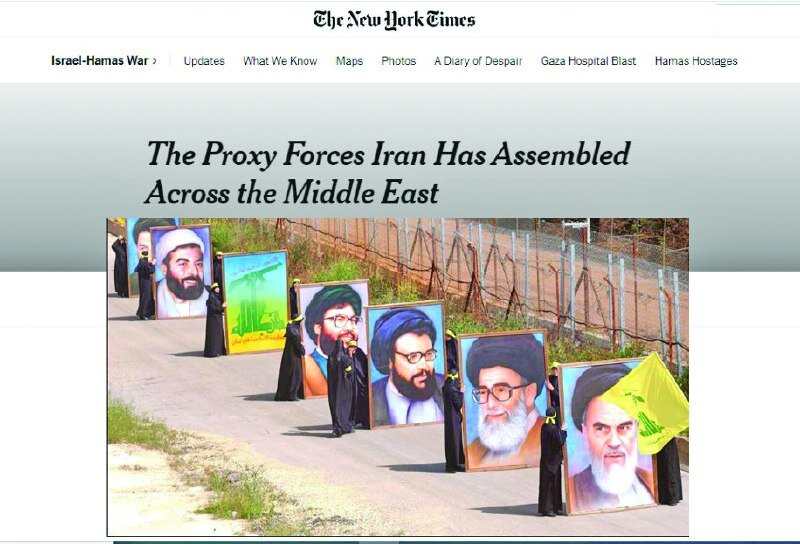Iran, resistance common traits: fight against autocracy for independence

TEHRAN- To desperately link the Palestinian resistance groups' achievements to Iran, the New York Times titled its October 27 analysis as “The proxy forces Iran has assembled across the Middle East”.
The October 7 uprising of Hamas against the Israeli tyranny, which was backed by various resistance groups, has raised significant concerns in the minds of Western think tanks which are hopelessly seeking answers for the causes of the uprising and reasons behind Tel Aviv’s irreparable defeat.
Neil MacFarquhar, the writer of the analysis, accused Iran of expanding extremism, saying it has been the “pillars of Iran’s foreign and security policy.”
Resistance emulation from Iran
What the U.S. calls “militias under the support of Iran” are in fact the groups that stem from the body of society. Resistance fighters do not tolerate autocracy. They take the side of civilians and do not bend their knees in the face of totalitarianism.
The propaganda run by the Western think tanks over Iran’s armed support for resistance groups is nothing but a myth to deviate the public opinion.
The Islamic Revolution has shared its anti-tyranny discourse overseas.
The most important feature of the discourse of the Islamic Revolution is the necessity of a Tawhidic perspective among people, which refers to a worldview based on the Islamic concept of Tawhid, or the oneness of God.
People stand as another characteristic of the discourse. They should be regarded as the guardians and the main supporters of resistance. Resistance has survived and prospered since it has been backed by people.
The third major factor of the discourse is independence as dependence weakens the essence of any movement and deviates the movement from its main ideals.
The “neither East nor West” slogan has always been the guideline for Iran’s foreign policy.
Meanwhile, resistance groups seem to have inherited the Islamic Revolution discourse.
Armed resistance, a response to the escalation of Israeli autocracy
The escalation of Israeli violence and its negligence over Palestinian rights left resistance fighters with no choice except to choose the path of “armed” resistance against the fake regime.
The armed resistance in Lebanon was also the result of the Israeli regime’s attacks on Lebanon in 1948, 1978, 1982, 1993, and 1996.
The sharper language of Israeli war minister Yoav Gallant on October 9 further proved the regime’s despotism.
Two days after the retaliatory operation by Hamas, Gallant addressed the Palestinian fighters and said: “We are fighting against human animals”.
This is while Chinese officials took the opposite point. China’s Foreign Minister Wang Yi told his Saudi Arabia counterpart Faisal bin Farhan Al Saud in a call on October 15 that “Israel’s actions have gone beyond self-defense and it should heed the call of the international community and the Secretary-General of the United Nations to stop its collective punishment of the people in Gaza”.
“The exercise of the right of self-defense should abide by international humanitarian law and should not be at the expense of innocent civilian casualties,” Wang said in a call with his Turkish counterpart, Hakan Fidan later in October.
The rejection of Palestinian rights exacerbated the tensions in the Gaza Strip, Foreign Minister Wang said in talks with his Malaysian counterpart on October 21. “The Palestinian-Israeli conflict, in essence, stems from the constant occupation of Palestinian land and the long-term neglect of the Palestinian people's demands for statehood,” Wang said.
Resistance, autonomous in action and thought
Some Western officials have kept claiming that the resistance groups take orders from Iran, but these movements are independent both in their actions and decisions.
The design and implementation of the Storm operation proved that resistance groups are totally independent. While in complete blockade, resistance fighters carried out the operation on the morning of October 7.
Despite the official statements of Matthew Miller, State Department spokesperson in his October 10 media briefing, and the U.S. intelligence community’s statement over Iran’s lack of involvement in the Hamas operation, some Western think tanks still insist on baseless speculations to link the Hamas operation to Iran.
Islamic teachings, commonality between resistance and Iran
The Islamic resistance means the persistence of Muslim countries, organizations, and individuals against the domination system and its allies.
Islamic teachings have made close boundaries between Iran and resistance groups, where the freedom-seekers do not let apartheid spread tyranny.
